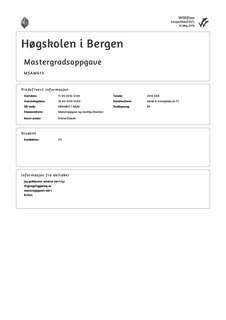| dc.contributor.author | Heggheim Nilsen, Trude | |
| dc.date.accessioned | 2018-02-01T14:55:02Z | |
| dc.date.available | 2018-02-01T14:55:02Z | |
| dc.date.issued | 2016-05-18 | |
| dc.identifier.uri | http://hdl.handle.net/11250/2481553 | |
| dc.description | Masteroppgave i samfunnsfagdidaktikk | en_GB |
| dc.description.abstract | Kina og Tibet er ueinige om Tibet sin status som stat. Tibet hevdar dei er ein sjølvstendig stat, medan Kina meiner dei har vore underlagd Kina i fleire århundre (Meland, 1998, s.173). I 1959 braut det ut eit stort opprør i den tibetanske houvudstaden, Lhasa. Mange tibetanarar flykta i samband med desse opprøra. I ettertid har også mange flykta på grunn av situasjonen i Tibet. Ein reknar med at om lag 120 000 tibetanarar lev i eksil i dag (Breidlid, 2004 s.296,). Rundt 20 000 av desse tibetanarane har flykta til Nepal, og nokon har budd der i fleire tiår. Føremålet med denne oppgåva er å undersøkje kva rolle utdanning spelar for dei tibetanske flyktningane i Nepal, og om utdanning er ein livelihood-strategi for desse flyktningane. Empirien har blitt belyst med utgangspunkt i teorien om berekraftig livelihood. Denne teorien tar for seg evner, aktivitetar og ressursar som kan nyttast for å sikre hushaldet. Livelihoodmodellen tek for seg fem ulike kapitalformer. (Scoones, 1998, s.5). I tillegg har det blant anna vore naudsynt å ta i bruk teori om empowerment og Amartya Sen si tilnærming om Capability Approach. For å svare på desse spørsmåla har eg utført eit to månadar langt feltarbeid i Kathmandu, Nepal. Der intervjua eg 25 tibetanarar mellom 19-35 år. I tillegg har eg gjennomført 9 intervju med andre aktørar som er sentrale i det tibetanske samfunnet i Kathmandu. Resultata av materialet fortel at det fins fleire svar på kva rolle utdanning spelar. Det kom fram at nesten alle informantane hadde foreldre som var analfabetar, og mange foreldre hadde tru på at gjennom utdanning kunne deira born få eit betre liv. Hushaldet hadde ei sentral rolle for val av livelihood-strategiar. Ein av dei store utfordringane tibetanarane i Nepal har, er at dei ikkje får statsborgarskap. Utan statsborgarskap er rettane deira sterkt avgrensa. Dette gjer framtida til informantane usikker. Likevel var der stor semje blant informantane om at utdanning er viktig for å utvikle seg som person. Ved å ta utdanning kan ein bli eit betre menneske. Det var usemje om utdaning kunne nyttast som livelihood-strategi. Nokon meinte at det ikkje var naudsynt med utdanning for å skaffe seg inntekt. Medan mange hadde sterk tru på at utdanning var det einaste ein kunne gjere for å få eit betre liv. Eg konkluderer derfor med at utdanning kan vere ein strategi for å sikre hushalda ein berekraftig livelihood. | en_GB |
| dc.description.abstract | China believes that Tibet has been a part of their territory for centuries. Tibet on the other hand claims to be a free nation. The Tibetans was discriminated by the Chinese. The Chinese presence and the suppression of the Tibetans lead to a big uprising in Lhasa, the capital of Tibet in 1959 (Meland, 1998, s.174,). During 1959 and the following years thousands of Tibetans fled from Tibet. Around 120 000 Tibetans live in exile to day (Breidlid, s.296, 2004). Roughly 20 000 of these refugees live in Nepal, and some of them have lived there for decades. The purpose of this thesis is to study the role of education among the Tibetan refugees in Kathmandu, Nepal, and whether education is used as a strategy in the pursue of a livelihood. The theory about sustainable livelihood is the theoretical framework of the analysis. A livelihood compromises the capabilities, assets and activities required for a means of living (Scoones, 1998, s.5). In addition to this theoretical framework, the Capability Approach have been useful. This approach is central in the literature of Amartya Sen. The concept of empowerment have also made an important addition to the theoretical framework. The research of this thesis is a result of two months of fieldwork in Kathmandu, Nepal. I conducted 25 interviews with Tibetan refugees from the age 19 to 35. I also did 10 interviews with other important actors for the Tibetan community. The results of the material tells us that there are multiple answers to what role education have among the Tibetan refugees. Parents seemed to have big influence. Almost all of the parents are illiterate, and they seemed to be supportive regarding their children’s education. The household in general played a big part in the pursuing of a livelihood. One of the big challenges for Tibetans in Nepal is the lack of citizenship. This makes many of the informants nervous about the future. Despite that, all of the informants felt that education was important on some level. It can make you a better person. There was also some different opinions about education as a way to construct a livelihood. Some informants said that education was not necessary to make money. On the other hand, some of the informants said that the key to a sustainable livelihood was education. I therefore conclude that education can be a strategy to ensure households a sustainable livelihood. | en_GB |
| dc.language.iso | nno | en_GB |
| dc.publisher | Bergen University College | en_GB |
| dc.rights | Attribution-NonCommercial-ShareAlike 3.0 Norway | * |
| dc.rights.uri | http://creativecommons.org/licenses/by-nc-sa/3.0/no/ | * |
| dc.subject.other | livelihood | en_GB |
| dc.subject.other | empowerment | en_GB |
| dc.subject.other | capabilities | en_GB |
| dc.subject.other | entitlement | en_GB |
| dc.subject.other | flyktninger | en_GB |
| dc.subject.other | utdanning | en_GB |
| dc.subject.other | Nepal | en_GB |
| dc.subject.other | Tibet | en_GB |
| dc.title | Utdanning si rolle for tibetanske flyktningar i Kathmandu, Nepal | en_GB |
| dc.title.alternative | The Role of Education among Tibetan Refugees in Kathmandu, Nepal | en_GB |
| dc.type | Master thesis | en_GB |

